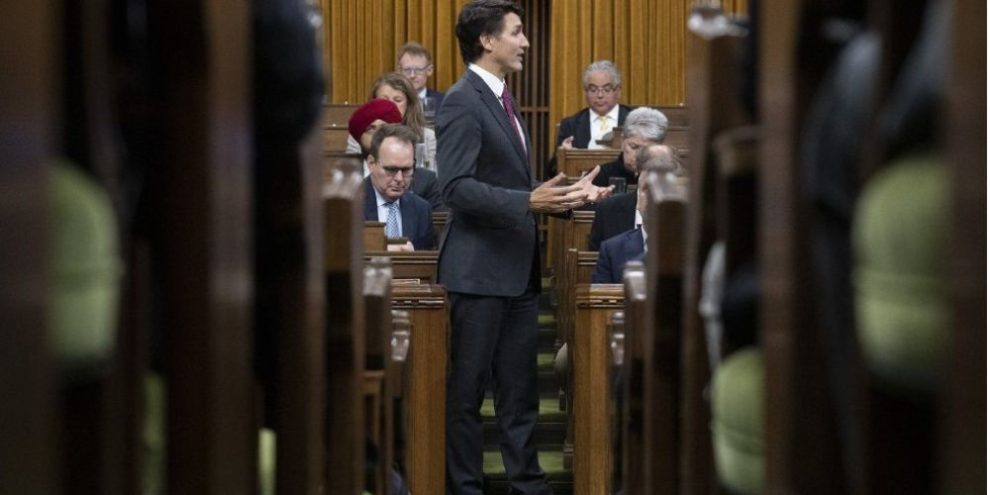
By Mia Rabson in Ottawa
The federal Liberals intend to introduce legislation soon that would eliminate the GST from new rental housing construction and backdate the change to mid-September regardless of when it becomes law, Housing Minister Sean Fraser said Monday.
The bill will also reflect Prime Minister Justin Trudeau's promise to extend the deadline by one year for small businesses to repay COVID-19 emergency loans, and update federal competition law to better prevent mergers that would result in higher prices for Canadian consumers.
But it is just one of at least three different bills political parties are introducing this fall to target the housing shortage and affordability concerns, as MPs return from their summer break determined to find relief for Canadians feeling the pinch of inflation.
The break did nothing to lower the political temperature in the House of Commons. The Conservatives used the summer to relaunch Leader Pierre Poilievre with a new look and an even sharper attack against the government, accusing it of breaking everything that Canadians hold dear.
First thing Monday morning, even before MPs returned to their seats, members of the government came out swinging against Poilievre and his party, who are eating the Liberals' lunch in the polls.
"We will not let self-serving partisan obstruction stand in the way of getting results for Canadians," House Leader Karina Gould said outside the House of Commons Monday morning.
She challenged Poilievre and his party to work with the government to solve the housing shortage and grocery price hikes, rather than simply "having a temper tantrum over in the corner."
The Conservatives, too, intend to introduce legislation on housing this week that would eliminate the GST on some rental construction. It would also withhold federal funding from cities that don't build more homes, and hold back infrastructure and transit funding when cities allow "NIMBYism" to block new developments.
NIMBY stands for "not in my backyard," a term applied when local residents or businesses oppose new types of development in their neighbourhoods.
Poilievre said Conservatives will create a system for Canadians to lodge formal complaints with Ottawa about NIMBYism. He said one of his party's main goals is to "reverse the housing hell that Justin Trudeau has caused for Canadians paying mortgages, buying homes or renting apartments."
"After eight years of Justin Trudeau, everything costs more," Poilievre said Sunday during a news conference on Parliament Hill.
"Work doesn't pay, housing costs have doubled, rent has doubled, the needed mortgage payment and down payment for a home have doubled."
Liberal programs, said Poilievre, require too much paperwork and take too long to roll out. He made fun of the name of the Liberals "housing accelerator fund," which took more than a year to get off the ground.
Fraser said he spent time over the weekend reading the Conservative plan and acknowledged there are some areas of agreement, including making the Canada Mortgage and Housing Corp. ensure that applications for its housing programs are decided upon within 60 days.
"That's something I had been thinking on, and credit where credit is due," Fraser said, giving a nod to Conservative MP Scott Aitchison for the idea.
"There's things we agree on, like that, that I think we can make progress by working together."
But then he trashed the rest of the Tories' plan.
"What I see with the Conservative plan is a handful of ideas that look frankly like they've been pulled off Google after a five-minute piece of research (and) thrown at the wall to see what sticks, rather than concrete solutions to very real problems with Canadian housing."
He called the NIMBYism reporting system a neighbourhood snitch line that won't do anything to get new homes built, and said the Conservative GST promise would be limited only to low-cost rentals, while the Liberals are removing the tax from all new rental construction.
"They're explicitly leaving out most homes that will be put up for middle-class Canadians," said Fraser.
That alone would add a new layer of bureaucracy, he added, just to decide which new rentals would qualify for the GST exemption and which wouldn't.
Poilievre insisted his plan would come with less bureaucracy.
In addition to pursuing changes to the Competition Act, the Liberals summoned the heads of the biggest grocery chains to push them for a plan to lower grocery prices. That meeting took place in Ottawa Monday.
Gould said if the grocery chains don't come up with a plan, the government may act, including with possible tax measures.
NDP Leader Jagmeet Singh had little time for that, introducing his own bill Monday to give more powers to the Competition Bureau to crack down on price gouging by grocery stores, while giving them more tools to protect consumers.
"The Liberal government has known for 20 months, almost two years, that the rate of inflation for food groceries has outpaced general inflation," he said.
"What we're proposing is not further delays, but a law that can be passed before families are buying groceries for Christmas dinner."
The Liberals also intend to introduce legislation this fall to create a national pharmacare program, which is a requirement of their agreement with the NDP.
The two parties reached the deal in 2022, with the NDP agreeing to support the Liberals on key votes in the minority Parliament in exchange for the government implementing some New Democrat priorities.
First up on the House agenda Monday was debate on a bail reform bill that seeks to make it harder for some violent offenders to get bail. Premiers have been pushing for the reforms for months.
Banner image: THE CANADIAN PRESS/Adrian Wyld
This report by The Canadian Press was first published Sept. 18, 2023.
— With a file from Mickey Djuric.





